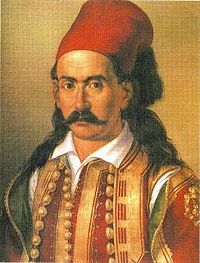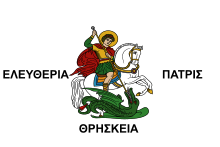- Markos Botsaris
-
For other uses, see Botsaris (disambiguation).
Markos Botsaris
Μάρκος Μπότσαρης
Born c. 1788
Souli (Epirus), Ottoman EmpireDied August 21, 1823
Kefalovryso near KarpenisiBuried at Missolonghi Allegiance  France (1807-1814)
France (1807-1814)
 United Kingdom of Great Britain and Ireland (1814-1815)
United Kingdom of Great Britain and Ireland (1814-1815)
 Revolutionary Greece (1821-1823)
Revolutionary Greece (1821-1823)Years of service 1807-1823 Rank General of the Greek Army Battles/wars Greek War of Independence:
First Siege of Missolonghi
Battle of Peta
Battle of KarpenisiMarkos Botsaris (Greek: Μάρκος Μπότσαρης, c. 1788 – 21 August 1823) was a Souliote captain[1] and a hero of the War of Greek Independence. Markos Botsaris is among the most revered national heroes in Greece.
Contents
Early life
Botsaris was born into one of the leading clans of the Souliotes, in Epirus.[2] He was the second son of captain Kitsos Botsaris, who was murdered in Arta in 1809 under the orders of Ali Pasha. The Botsaris clan came from the village of Dragani (today Ambelia), near Paramythia.
French Army and Ottoman Army
In 1803, after the capture of Souli by Ali Pasha, Botsaris and the remnants of the Souliotes crossed over to the Ionian Islands, where he served in the Albanian regiment of the French army for 11 years and became one the regiment's officers.[3]
In 1814, he joined the Greek patriotic society known as the Filiki Eteria. In 1820, with other Souliots, he came back to Epirus and fought against Ali Pasha in the Ottoman army at the Siege of Ioannina, but soon the Souliotes changed side and fought the Ottoman army with the troops of Ali Pasha, in exchange of their former region, the Souli.
Greek War of Independence
In 1821, Botsaris made common cause with the Greeks against the Ottoman Empire. He and other Souliot captains, including Kitsos Tzavelas, Notis Botsaris, Lampros Veikos, and Giotis Danglis only enlisted fellow Souliot kin in to their bands.[1] At the outbreak of the Greek War of Independence, he distinguished himself by his courage, tenacity and skill as a partisan leader in the fighting in western Greece, and was conspicuous in the defence of Missolonghi during the first siege of the city (1822–1823).
On the night of 21 August 1823 he led the celebrated attack on Karpenisi by 350 Souliots, against around 1,000 Ottoman troops who formed the vanguard of the army with which Mustai Pasha was advancing to reinforce the besiegers. Botsaris managed to take Mustai Pasha as a prisoner during the raid,[citation needed] but he was shot in the head and killed in battle by Llesh i Zi, an Albanian.[4]
Family and Companions
Many of his family members became key figures of the Greek political establishment. Markos' brother Kostas (Constantine) Botsaris, who also fought at Karpenisi and completed the victory, lived on to become a respected Greek general and parliamentarian in the Greek kingdom.[5] He died in Athens on 13 November 1853. Markos's son, Dimitrios Botsaris, born in 1813, was three times minister of war during the reigns of Otto of Greece and George I of Greece. He died in Athens on 17 August 1870. His daughter, Katerina "Rosa" Botsari, was in the service of Queen Amalia of Greece.
Markos' son, Dimitrios Botsaris became three times Minister of War of Greece, under Kings Otto and George I.[6]
Evangelis Zappas, the renowned benefactor and founder of the modern Olympic Games, was the aide-de-camp and close friend of Markos Botsaris.[7]
Legacy
Many Philhellenes visiting Greece had admired Botsaris' courage and numerous poets wrote poems about him. American poet Fitz-Greene Halleck wrote a poem entitled Marco Bozzaris, Juste Olivier also wrote an award-winning poem for him, in 1825.[8] His memory is still celebrated in popular ballads in Greece.
Botsaris is also widely considered to be the author of a Greek-Albanian lexicon written in Corfu in 1809, at the insistence of François Pouqueville, Napoleon Bonaparte's general consul at the court of Ali Pasha in Ioannina.[9] The dictionary is of importance for the knowledge of the extinct Souliot dialect.[10] However, although the book is known as the Botsaris dictionary, scholar Xhevat Lloshi has argued in several works that Botsaris couldn't have possibly written that dictionary by himself, both because of his young age, and because of a note of Puqueville that clearly says that the dictionary was drafted under the dictation of Marko's father, uncle, and future father-in-law.[11]
In Greek music, there are various folk songs dedicated to Botsaris, like a Tsamiko from Central Greece, named Song of Markos Botsaris (Greek: του Μάρκου Μπότσαρη),[12] and from the Greek minority of southern Albania (Northern Epirus) (Καημένε Μάρκο Μπότσαρη).[13] In Albanian music (Albanian: Marko Boçari)[14][15] there is a polyphonic song of the 19th century titled Song of Marko Boçari from Suli (Albanian: Kënga e Marko Boçarit nga Suli) lamenting his death.[16]
Botsaris was depicted on the reverse of the Greek 50 lepta coin of 1976-2001.[17] He often adorns posters in Greek classrooms, government offices, and military barracks, as a member of the Greek pantheon of national heroes.
Gallery
-
An oil painting on canvas of Markos Botsaris by Jean-Léon Gérôme, 1874.
-
Tomb of Markos Botsaris, monument created by French sculptor David d'Angers, Missolonghi, Greece.
-
The death of Markos Botsaris. Painting by Ludovico Lipparini, Civico Museo Sartorio, Trieste, Italy.
-
Katerina Rosa Botsaris (daughter of Markos) painted by Joseph Karl Stieler, Schönheitengalerie, Munich.
References
- ^ a b Brigands with a Cause, Brigandage and Irredentism in Modern Greece 1821-1912, by John S. Koliopoulos, Clarendon Press, Oxford. 1987. p. 53. ISBN 0-19-822863-5
- ^ Katherine Elizabeth Fleming. The Muslim Bonaparte: diplomacy and orientalism in Ali Pasha's Greece. Princeton University Press, 1999. ISBN 978-0-691-00194-4, p. 99"The Souliotes, a Greek-speaking tribe of Albanian origin... Ali had tried off and over..."
- ^ Zamoyski, Adam (2000). Holy madness: romantics, patriots, and revolutionaries, 1776-1871. Viking. p. 232. ISBN 0670892718. http://books.google.com/books?id=vd2ZAAAAIAAJ&q=Albanian+regiment+Botsaris&dq=Albanian+regiment+Botsaris&hl=en&ei=faJdTK3vE4SmsQaLv_TDBw&sa=X&oi=book_result&ct=result&resnum=9&ved=0CFAQ6AEwCA.
- ^ Academie of Sciences of Albania (1979). "Studia Albanica" (in French). Studia Albanica: 73. http://books.google.com/books?id=o2FpAAAAMAAJ&q=lleshi+zi+marko&dq=lleshi+zi+marko&hl=en&ei=xGJhTMTMEMH-8Aa2vKSPCg&sa=X&oi=book_result&ct=book-thumbnail&resnum=2&ved=0CDMQ6wEwAQ.
- ^ University of Chicago (1946). Encyclopædia britannica: a new survey of universal knowledge, Volume 3. Encyclopædia britannica, inc. p. 957. "Marco Botsaris’s brother Kosta (Constantine), who fought at Karpenisi and completed the victory, lived to become a general and senator in the Greek Kingdom. Kosta died in 1853.."
- ^ University of Chicago. Encyclopædia britannica: a new survey of universal knowledge. Encyclopædia britannica, inc., 1946, p. 957
- ^ The Modern Olympics, A Struggle for Revival, by David C. Young. p. 13. 1996 The Johns Hopkins University Press. ISBN 0-8018-5374-5
- ^ Poetry Archive - Marco Bozzaris
- ^ Markos Botsarēs, Titos P. Giochalas: To Hellēno-Alvanikon lexikon tou Markou Botsarē: (philologikē ekdosis ek tou autographou), Grapheion Dēmosieumatōn tēs Akadēmias Athēnōn, 1980, 424 pages.
- ^ JOCHALAS, Titos, To ellino-alvanikon lexikon tou Markou Botzari, Athens 1980.
- ^ Lloshi, Xhevat (2008). bocari rreth alfabetit&hl=en&ei=QAIFTNfqAcH-8AaswL3UDQ&sa=X&oi=book_result&ct=book-thumbnail&resnum=1&ved=0CC8Q6wEwAA#v=onepage&q&f=false Rreth Alfabetit te shqipes. Logos. p. 107. ISBN 99895822688. http://books.google.com/books?id=9_gXTda0HS8C&pg=PA191&dq=marko bocari rreth alfabetit&hl=en&ei=QAIFTNfqAcH-8AaswL3UDQ&sa=X&oi=book_result&ct=book-thumbnail&resnum=1&ved=0CC8Q6wEwAA#v=onepage&q&f=false. Retrieved 2010-06-01.
- ^ Antōnēs I. Phlountzēs Akronauplia kai Akronaupliōtes, 1937-1943. Themelio, 1979, p. 286 (Greek)
- ^ Nikolaos V. Dēmētriou,Eleutherios N. Dēmētriou. Voreios Ēpeiros: tragoudia kai choroi. Trochalia, 2000, p. 45.
- ^ D'Istria, Dora ([1866] 2006). "The Albanian nationality on the basis of popular songs ('La nationalité albanaise d'après les songs populaires')". In Trencsényi, Balázs; Kopeček, Michal. Discourses of collective identity in Central and Southeast Europe (1770-1945): texts and commentaries. Late Enlightenment — Emergence of the Modern National Idea. 1. Central European University Press. p. 173. ISBN 9637326529. http://books.google.com/books?id=TpPWvubBL0MC&pg=PA173&dq=marko+bocari&lr=&as_brr=3&hl=en&cd=1#v=onepage&q=marko%20bocari&f=false.
- ^ Clayer, Natalie (2007) (in French). Aux origines du nationalisme albanais: la naissance d'une nation majoritairement musulmane en Europe. KARTHALA Editions. pp. 309–10. ISBN 2845868162. http://books.google.com/books?id=umotBF3KFWgC&pg=PA164&dq=marko+boçari&lr=&as_brr=3&hl=en&cd=7#v=onepage&q&f=false.
- ^ American Foklore Society (1954). Memoirs of the American Folklore Society. American Folklore Society. 44. University of Texas Press. p. 173. http://books.google.com/books?id=8m07AAAAIAAJ&q=song+Bocari&dq=song+Bocari&lr=&hl=en&cd=12.
- ^ Bank of Greece. Drachma Banknotes & Coins: 50 lepta. – Retrieved on 27 March 2009.
Sources
 This article incorporates text from a publication now in the public domain: Chisholm, Hugh, ed (1911). Encyclopædia Britannica (11th ed.). Cambridge University Press.
This article incorporates text from a publication now in the public domain: Chisholm, Hugh, ed (1911). Encyclopædia Britannica (11th ed.). Cambridge University Press.- Botsaris, 180 Years from the Greek Revolution
- Lloshi, Xhevat (2008). Rreth Alfabetit te Shqipes. Logos. http://books.google.com/books?id=9_gXTda0HS8C&pg=PA191&dq=gjuha+letrare+dhe+gjuha+standarde&hl=en&ei=QAIFTNfqAcH-8AaswL3UDQ&sa=X&oi=book_result&ct=book-thumbnail&resnum=1&ved=0CC8Q6wEwAA#v=onepage&q&f=false.
Categories:- 1788 births
- 1823 deaths
- People from Thesprotia
- Greek revolutionaries
- Souliotes
- People of the Greek War of Independence
-
Wikimedia Foundation. 2010.







